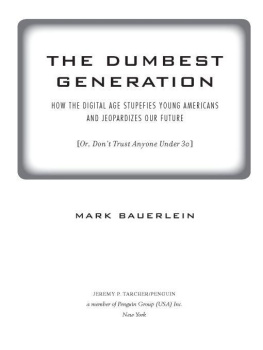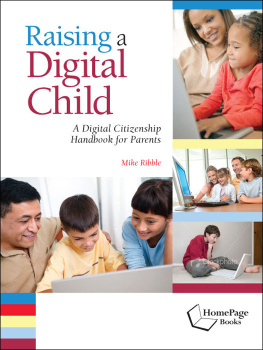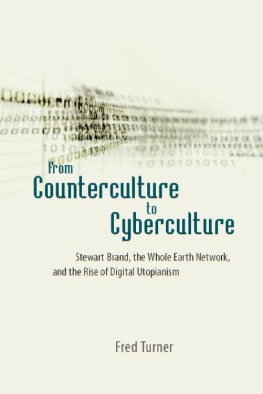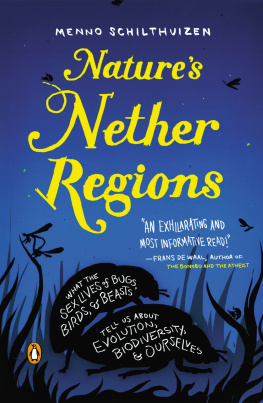Table of Contents
JEREMY P. TARCHER/PENGUIN
Published by the Penguin Group
Penguin Group (USA) Inc., 375 Hudson Street, New York, New York 10014, USA
Penguin Group (Canada), 90 Eglinton Avenue East, Suite 700, Toronto,
Ontario M4P 2Y3, Canada (a division of Pearson Canada Inc.) Penguin Books Ltd,
80 Strand, London WC2R 0RL, England Penguin Ireland, 25 St Stephens Green,
Dublin 2, Ireland (a division of Penguin Books Ltd) Penguin Group
(Australia), 250 Camberwell Road, Camberwell, Victoria 3124, Australia (a division of
Pearson Australia Group Pty Ltd) Penguin Books India Pvt Ltd, 11 Community Centre,
Panchsheel Park, New Delhi-110 017, India Penguin Group (NZ),
67 Apollo Drive, Rosedale, North Shore 0632, New Zealand (a division
of Pearson New Zealand Ltd) Penguin Books (South Africa) (Pty) Ltd,
24 Sturdee Avenue, Rosebank, Johannesburg 2196, South Africa
Penguin Books Ltd, Registered Offices:
80 Strand, London WC2R 0RL, England
Copyright 2008 by Mark Bauerlein
All rights reserved. No part of this book may be reproduced, scanned, or distributed
in any printed or electronic form without permission. Please do not participate in or
encourage piracy of copyrighted materials in violation of the authors rights.
Purchase only authorized editions. Published simultaneously in Canada
Most Tarcher/Penguin books are available at special quantity discounts for
bulk purchase for sales promotions, premiums, fund-raising, and educational needs.
Special books or book excerpts also can be created to fit specific needs.
For details, write Penguin Group (USA) Inc. Special Markets,
375 Hudson Street, New York, NY 10014.
Library of Congress Cataloging-in-Publication Data
Bauerlein, Mark.
The dumbest generation : how the digital age stupefies young Americans and
jeopardizes our future (or, dont trust anyone under 30) / Mark Bauerlein.
p. cm.
eISBN : 978-1-436-22176-4
1. Young adultsEffect of technological innovations onUnited States.
2. Technology and youthUnited States. 3. Young adultsUnited States
Attitudes. 4. InternetSocial aspectsUnited States. I. Title.
HQ799.7B
302.231dc22
While the author has made every effort to provide accurate telephone numbers and Internet addresses at the time of publication, neither the publisher nor the author assumes any responsibility for errors, or for changes that occur after publication. Further, the publisher does not have any control over and does not assume any responsibility for author or third-party websites or their content.
http://us.penguingroup.com
INTRODUCTION
When writer Alexandra Robbins returned to Walt Whitman High School in Bethesda, Maryland, ten years after graduating, she discovered an awful trend. The kids were miserable. She remembers her high school years as a grind of study and homework, but lots more, too, including leisure times that allowed for well-roundedness. Not for Whitman students circa 2005. The teens in The Overachievers, Robbinss chronicle of a year spent among them, have only one thing on their minds, SUCCESS, and one thing in their hearts, ANXIETY. Trapped in a mad culture of overachieverism, they run a frantic race to earn an A in every class, score 750 or higher on the SATs, take piano lessons, chalk up AP courses on their transcripts, stay in shape, please their parents, volunteer for outreach programs, and, most of all, win entrance to HYP (Harvard-Yale -Princeton).
As graduation approaches, their rsums lengthen and sparkle, but their spirits flag and sicken. One Whitman junior, labeled by Robbins The Stealth Overachiever, receives a fantastic 2380 (out of 2400) on a PSAT test, but instead of rejoicing, he worries that the company administering the practice run made the diagnostics easier so students would think the class was working.
Audrey, The Perfectionist, struggles for weeks to complete her toothpick bridge, which she and her partner expect will win them a spot in the Physics Olympics. Shes one of the Young Democrats, too, and she does catering jobs. Her motivation stands out, and she thinks every other student competes with her personally, so whenever she receives a graded test or paper, she [turns] it over without looking at it and then [puts] it away, resolving not to check the grade until she [gets] home.
AP Frank became a Whitman legend when as a junior he managed a seven-AP course load that had him studying every afternoon, sleeping during class, and going lunchless. When he scored 1570 on the SAT, his domineering mother screamed in dismay, and her shock subsided only when he retook it and got the perfect 1600.
Julie, The Superstar, has five AP classes and an internship three times a week at a museum, and she runs cross-country as well. Every evening after dinner she descends to the homework cave until bedtime and beyond. She got only 1410 on the SAT, though, and she wonders where it will land her next fall.
These kids have descended into a competitive frenzy, Robbins mourns, and the high school that should open their minds and develop their characters has become a torture zone, a hotbed for Machiavellian strategy. They bargain and bully and suck up for better grades. They pay tutors and coaches enormous sums to raise their scores a few points and help with the admissions process. Parents hover and query, and they schedule their children down to the minute. Grade inflation only makes it worse, an A- average now a stigma, not an accomplishment. They cant relax, they cant play. Its killing them, throwing sensitive and intelligent teenagers into pathologies of guilt and despair. The professional rat race of yoremen in gray flannel suits climbing the business ladderhas filtered down into the pre-college years, and Robbinss tormented subjects reveal the consequences.
The achievement chase displaces other life questions, and the kids cant seem to escape it. When David Brooks toured Princeton and interviewed students back in 2001, he heard of joyless days and nights with no room for newspapers or politics or dating, just one skill-enhancing activity to the next. He calls them Organization Kids (after the old Organization Man figure of the fifties), students who have to schedule appointment times for chatting. Theyve been programmed for success, and a preschool-to-college gauntlet of standardized tests, mounting homework, motivational messages, and extracurricular tasks has rewarded or punished them at every stage. The system tabulates learning incessantly and ranks students against one another, and the students soon divine its essence: only results matter. Education writer Alfie Kohn summarizes their logical adjustment:
Consider a school that constantly emphasizes the importance of performance! results! achievement! success! A student who has absorbed that message may find it difficult to get swept away by the process of creating a poem or trying to build a working telescope. He may be so concerned about the results that hes not at all that engaged in the activity that produces those results.
Just get the grades, they tell themselves, ace the test, study, study, study. Assignments become exercises to complete, like doing the dishes, not knowledge to acquire for the rest of their lives. The inner life fades; only the external credits count. After-school hours used to mean sports and comic books and hanging out. Now, they spell homework. As the president of the American Association of School Librarians told the Washington Post, When kids are in school now, the stakes are so high, and they have so much homework that its really hard to find time for pleasure reading (see Strauss). Homework itself has become a plague, as recent titles on the subject show: The End of Homework: How Homework Disrupts Families, Overburdens Children, and Limits Learning (Etta Kralovec and John Buell); The Homework Myth: Why Our Kids Get Too Much of a Bad Thing (Alfie Kohn); and The Case Against Homework: How Homework Is Hurting Our Children and What We Can Do About It (Sara Bennett and Nancy Kalish).









